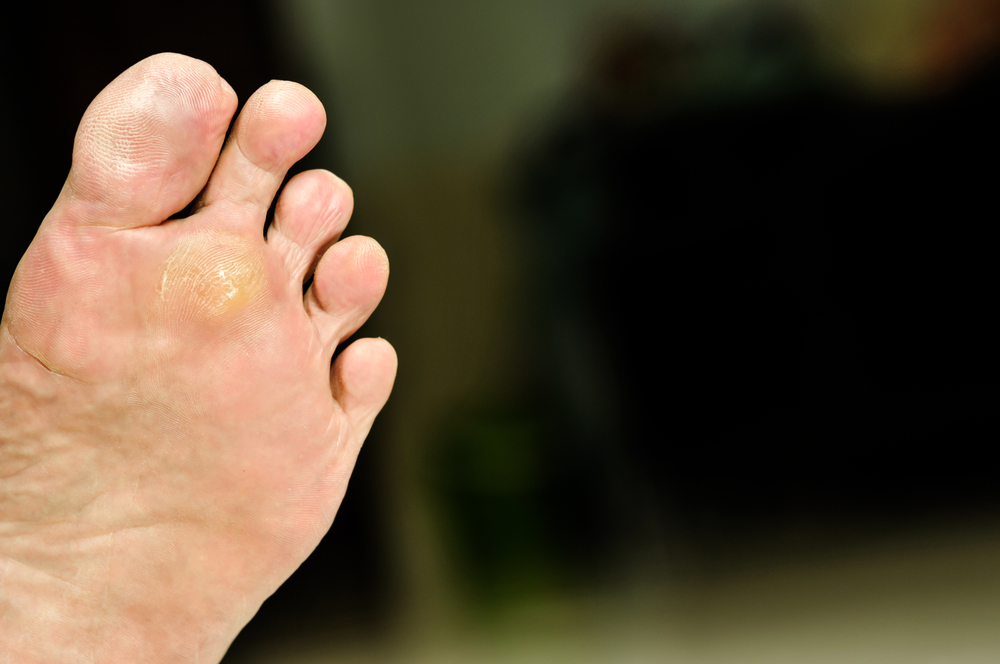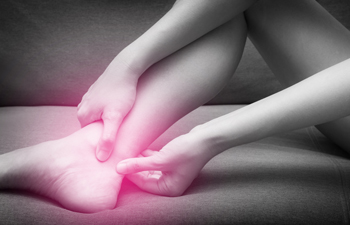Connect With Us
Blog
Items filtered by date: January 2022
Bursitis: A Real Pain in the Heel
There are many causes of heel pain, including bursitis. The retrocalcaneal bursa is a fluid-filled sac located between the heel bone and the Achilles tendon. It cushions and lubricates the tendon as it slides over the heel bone, while acting as a shock absorber during walking and other movements. Excessive walking, running, jumping or other stress inducing activities placed upon the ankle may cause this bursa to become swollen, irritated, and inflamed. The skin at the back of the heel may be warm or red. The affected area may also become very sensitive to the touch, and painful during physical activity or when standing on your toes. If you feel this type of pain at the back of your heel that does not improve with rest, it is in your best interest to schedule an appointment with a podiatrist. They will perform a physical examination and may recommend certain conservative treatments such as icing, anti-inflammatory medication, orthotics or heel wedges to reduce stress on the heel, ultrasound and/or physical therapy, or possibly even steroid injections if other methods do not work.
Many people suffer from bouts of heel pain. For more information, contact the foot specialists of Affiliates in Foot Care, P.C.. Our doctors can provide the care you need to keep you pain-free and on your feet.
Causes of Heel Pain
Heel pain is often associated with plantar fasciitis. The plantar fascia is a band of tissues that extends along the bottom of the foot. A rip or tear in this ligament can cause inflammation of the tissue.
Achilles tendonitis is another cause of heel pain. Inflammation of the Achilles tendon will cause pain from fractures and muscle tearing. Lack of flexibility is also another symptom.
Heel spurs are another cause of pain. When the tissues of the plantar fascia undergo a great deal of stress, it can lead to ligament separation from the heel bone, causing heel spurs.
Why Might Heel Pain Occur?
- Wearing ill-fitting shoes
- Wearing non-supportive shoes
- Weight change
- Excessive running
Treatments
Heel pain should be treated as soon as possible for immediate results. Keeping your feet in a stress-free environment will help. If you suffer from Achilles tendonitis or plantar fasciitis, applying ice will reduce the swelling. Stretching before an exercise like running will help the muscles. Using all these tips will help make heel pain a condition of the past.
If you have any questions please contact our office located in Woburn, MA . We offer the newest diagnostic and treatment technologies for all your foot and ankle needs.
What Do Plantar Warts Look Like?
Plantar warts are non-cancerous, rough growths that appear on pressure points located on the sole of the foot. They are caused by the human papillomavirus (HPV), which is spread through direct contact with a plantar wart or an object where HPV is present. Plantar warts are usually flat, and either brown, gray or flesh-colored. They can sometimes have black dots in the center, which are tiny capillaries that supply the wart with blood. Warts can grow individually or appear in clusters. They may be painful when you apply pressure to the bottom of the foot or walk on them. There are several types of therapies podiatrists can use to remove these warts permanently. If you notice a growth on the bottom of your foot that has the characteristics described here, please contact a podiatrist to confirm that what you see is a plantar wart and to receive proper care.
Plantar warts can be very uncomfortable. If you need your feet checked, contact the foot specialists from Affiliates in Foot Care, P.C.. Our doctors will assist you with all of your foot and ankle needs.
About Plantar Warts
Plantar warts are the result of HPV, or human papillomavirus, getting into open wounds on the feet. They are mostly found on the heels or balls of the feet.
While plantar warts are generally harmless, those experiencing excessive pain or those suffering from diabetes or a compromised immune system require immediate medical care. Plantar warts are easily diagnosed, usually through scraping off a bit of rough skin or by getting a biopsy.
Symptoms
- Lesions on the bottom of your feet, usually rough and grainy
- Hard or thick callused spots
- Wart seeds, which are small clotted blood vessels that look like little black spots
- Pain, discomfort, or tenderness of your feet when walking or standing
Treatment
- Freezing
- Electric tool removal
- Laser Treatment
- Topical Creams (prescription only)
- Over-the-counter medications
To help prevent developing plantar warts, avoid walking barefoot over abrasive surfaces that can cause cuts or wounds for HPV to get into. Avoiding direct contact with other warts, as well as not picking or rubbing existing warts, can help prevent the further spread of plantar warts. However, if you think you have developed plantar warts, speak to your podiatrist. He or she can diagnose the warts on your feet and recommend the appropriate treatment options.
If you have any questions please feel free to contact our office located in Woburn, MA . We offer the newest diagnostic and treatment technologies for all your foot and ankle needs.
What Do Podiatrists Do?
Podiatrists are medical professionals who diagnose, treat, and offer preventative care for problems that affect the feet, ankles, and lower legs. Podiatrists may treat various foot and ankle injuries, such as plantar fasciitis, ankle sprains, and stress fractures. They can also address foot deformities, such as bunions, and skin or nail conditions like athlete’s foot or fungal toenails. A podiatrist might play a major role in a patient’s care if they have diabetes, poor circulation, or neuropathy, as these conditions frequently affect the feet. Some podiatrists are also trained in surgery. If you have developed a foot or ankle problem, it is suggested that you consult with a podiatrist.
If you are dealing with pain in your feet and ankles, you may want to seek help from a podiatrist. Feel free to contact the foot specialists from Affiliates in Foot Care, P.C.. Our doctors can provide the care you need to keep you pain-free and on your feet.
What Is a Podiatrist?
A podiatrist is a doctor of podiatric medicine who diagnoses and treats conditions of the foot, ankle, and related structures of the leg. Your podiatrist may specialize in a certain field such as sports medicine, wound care, pediatrics, and diabetic care. Podiatrists have the ability to become board certified through training, clinical experience, and then taking an exam.
What Do Podiatrists Do?
On a daily basis, a podiatrist may perform the following activities:
- Diagnose foot ailments such as ulcers, tumors, fractures, etc.
- Use innovative methods to treat conditions
- Use corrective orthotics, casts, and strappings to correct deformities
- Correct walking patterns and balance
- Provide individual consultations to patients
It is very important that you take care of your feet. It’s easy to take having healthy feet for granted, however foot problems tend to be among the most common health conditions. Podiatrists can help diagnose and treat a variety of feet related conditions, so it is crucial that you visit one if you need assistance.
If you have any questions please feel free to contact our office located in Woburn, MA . We offer the newest diagnostic and treatment technologies for all your foot and ankle needs.
We Can Treat Your Foot or Ankle Pain
What Is Achilles Tendonitis?
The Achilles tendon is one of the longest tendons in the body. It attaches the calf muscles to the heel bone (calcaneus). Because it is a critical part of the body’s walking and running movements, it can become damaged due to wear and tear. People who play tennis, softball, volleyball, soccer, or participate in track and field are more prone to developing problems with their Achilles tendon. Achilles tendonitis is an overuse injury that produces symptoms including inflammation, stiffness, and pain. This condition can make tears in the Achilles tendon more likely, which typically occur after a sudden traumatic event like an injury. It may be difficult to walk or stand if the Achilles tendon is torn. If you have suffered from an injury that is causing pain, inflammation or stiffness in the Achilles tendon, contact a podiatrist to receive the proper care you need.
Achilles tendon injuries need immediate attention to avoid future complications. If you have any concerns, contact the foot specialists of Affiliates in Foot Care, P.C.. Our doctors can provide the care you need to keep you pain-free and on your feet.
What Is the Achilles Tendon?
The Achilles tendon is a tendon that connects the lower leg muscles and calf to the heel of the foot. It is the strongest tendon in the human body and is essential for making movement possible. Because this tendon is such an integral part of the body, any injuries to it can create immense difficulties and should immediately be presented to a doctor.
What Are the Symptoms of an Achilles Tendon Injury?
There are various types of injuries that can affect the Achilles tendon. The two most common injuries are Achilles tendinitis and ruptures of the tendon.
Achilles Tendinitis Symptoms
- Inflammation
- Dull to severe pain
- Increased blood flow to the tendon
- Thickening of the tendon
Rupture Symptoms
- Extreme pain and swelling in the foot
- Total immobility
Treatment and Prevention
Achilles tendon injuries are diagnosed by a thorough physical evaluation, which can include an MRI. Treatment involves rest, physical therapy, and in some cases, surgery. However, various preventative measures can be taken to avoid these injuries, such as:
- Thorough stretching of the tendon before and after exercise
- Strengthening exercises like calf raises, squats, leg curls, leg extensions, leg raises, lunges, and leg presses
If you have any questions please feel free to contact our office located in Woburn, MA . We offer the newest diagnostic tools and technology to treat your foot and ankle needs.





